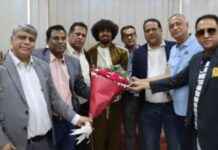Salahuddin Ahmed, a member of the permanent committee of the Bangladesh Nationalist Party (BNP), made a bold statement during a party rally in Feni on Sunday. He declared Prime Minister Sheikh Hasina, the leader of the fallen Awami League government, as a United Nations-accredited killer. The rally, organized by the Feni district BNP, aimed to address issues of inflation, improved law and order, justice for victims of extrajudicial killings, and a swift transition to democratic governance.
Insights from Party Leaders and Members
The event, held at Mizan Maidan in Feni city on Sunday afternoon, featured prominent figures from the BNP. Sheikh Bahar Uddin, the district BNP convener, chaired the rally, with Anwar Patwari, the deputy to the party’s chairperson, Professor Joynal Abedin, and committee member Jalal Uddin Majumdar among the speakers. They were joined by central and local leaders and workers, all voicing their concerns and perspectives on the current political landscape.
Salahuddin Ahmed’s accusations against Sheikh Hasina’s government in the wake of the July uprising highlight a growing sentiment within the opposition. He emphasized the need for a national election in December without delay, urging for an inclusive electoral process that upholds the principles of democracy. Ahmed’s call for electoral integrity resonates with those seeking a fair and transparent electoral system in Bangladesh.
Advocating for Political Accountability and Social Reform
In his address, Salahuddin Ahmed underscored the importance of political accountability and social reform in shaping Bangladesh’s future. He criticized the incumbent government for its alleged involvement in extrajudicial killings and emphasized the need for a strong legal framework to prevent abuses of power. By calling for a focus on governance and market stability, Ahmed highlighted the urgency of addressing systemic issues that impact the daily lives of Bangladeshi citizens.
Ahmed’s insistence on timely elections and the empowerment of local governance reflects a broader push for democratic values and grassroots participation in decision-making. His remarks on the lack of geographical knowledge among certain voters underscore the importance of civic education and awareness in ensuring informed electoral choices. By championing the rights of local governments and advocating for electoral transparency, Ahmed positions himself as a voice for political reform and social progress in Bangladesh.
In conclusion, Salahuddin Ahmed’s bold statements at the BNP rally in Feni shed light on the current political climate in Bangladesh. As the country navigates complex challenges related to governance, accountability, and electoral integrity, voices like Ahmed’s play a crucial role in shaping the discourse and advocating for meaningful change. By addressing issues of national importance with clarity and conviction, Ahmed underscores the ongoing struggle for political accountability and social justice in Bangladesh.
Salahuddin Ahmed’s remarks remind us of the critical role that political opposition and civic engagement play in safeguarding democracy and promoting transparency in governance. As Bangladesh moves forward, the voices of leaders like Ahmed serve as a reminder of the ongoing quest for justice, accountability, and democratic values in the nation’s political landscape.




















